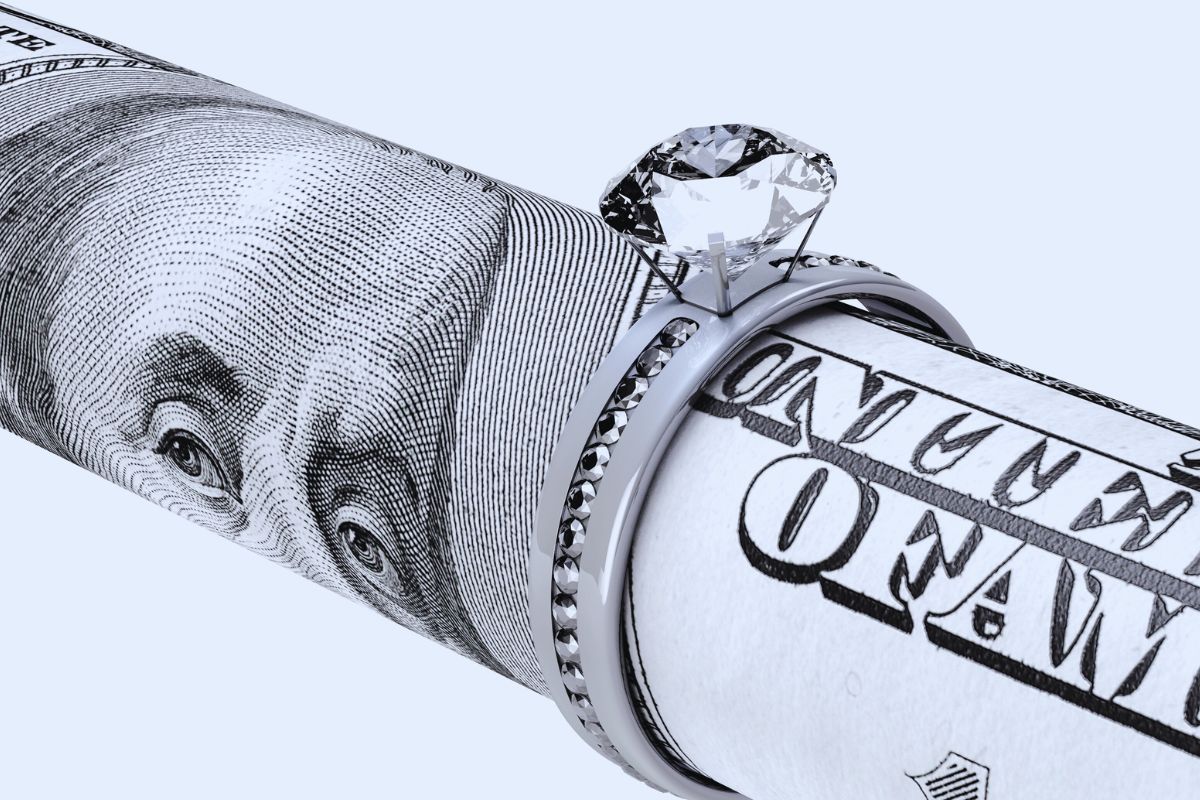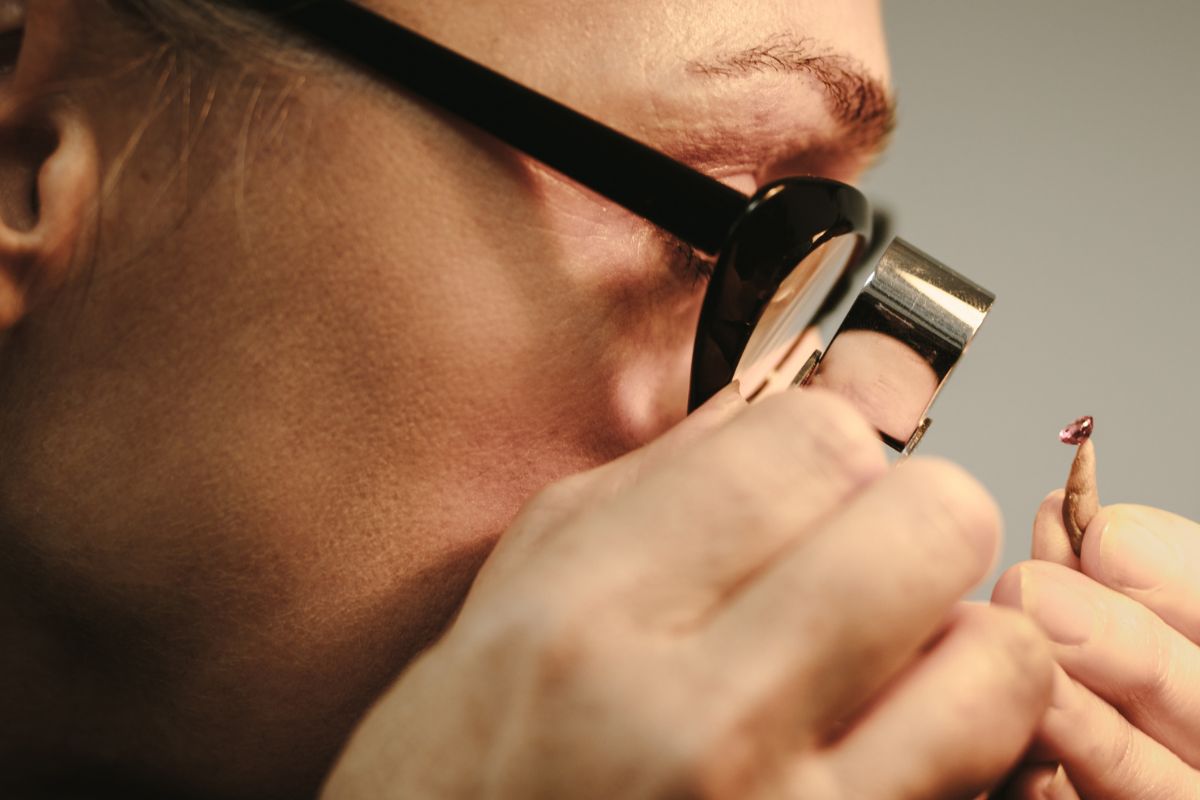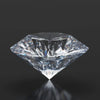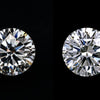
Diamond Ring Appraisal: Your Guide to Valuing Sparkling Treasures
When you consider having a diamond ring appraised, you're taking an important step in recognizing and documenting the value of your precious jewelry. An appraisal can serve multiple functions; whether for insurance purposes, to establish fair market value, or in anticipation of a sale, understanding the worth of your diamond ring can bring peace of mind and financial clarity. It involves a detailed evaluation of the ring’s characteristics such as the cut, color, clarity, and carat weight of the diamond, as well as the style and craftsmanship of the ring itself.
Table Of Contents
The appraisal process is a meticulous one, wherein each aspect of your diamond ring is examined and valued by a professional gemologist. To accurately ascertain the value, they will not only look at the intrinsic quality of the diamond but also consider current market trends and the retail prices of similar rings. If you're looking to clean your diamonds prior to appraisal, professional methods, as indicated in a Springer publication, involve cleaning the piece with a gentle solution to ensure its brilliance is evaluated correctly.
Your appraisal document is a formal statement of value that often includes a detailed description, quality analysis, and a clear photograph of the item. This document confirms your ring’s authenticity and value, which is essential for insurance coverage, and it may also include a replacement cost. It is important to note that the assigned value of your diamond ring can aid in a variety of legal and financial situations. Therefore, ensuring that your appraisal is kept up-to-date will reflect any changes in the market value of your diamond ring.
Understanding Diamond Ring Appraisal
When seeking an accurate evaluation of a diamond ring's value, the expertise involved in the appraisal process is crucial. Providing peace of mind and a basis for insurance or resale, it's essential to understand the purpose, method, and key players in the valuation of your precious gemstone.
Purpose and Importance of Appraisal
The appraisal of a diamond ring serves to assign a monetary value to the piece, which is vital for insurance purposes, resale value assessment, division of assets, or simply for personal knowledge. This formal document not only affirms the authenticity and quality of the diamond but also provides detailed descriptions covering cut, color, clarity, carat weight, and craftsmanship—key elements affecting the ring's overall value.
Appraisal Process Overview
- Initial Examination: A certified gemologist begins with a thorough visual inspection using specialized tools, such as a loupe or microscope, to scrutinize the diamond's attributes.
- Documentation Check: Existing paperwork, certificates, or receipts related to the diamond are reviewed to verify prior evaluations or sales information.
- Assessment: Each aspect of the diamond, including the 4 Cs (Carat, Cut, Color, Clarity), is evaluated, in addition to the setting and metal quality.
- Market Research: The gemologist consults current market data to determine the diamond's replacement value based on comparable current retail prices.
- Report Generation: A detailed appraisal report is created, itemizing all findings and assigning a value to the diamond ring.
The Role of a Certified Gemologist
A certified gemologist—trained and credentialed by reputable institutions—is essential for a trustworthy and precise appraisal. Their expertise allows them to discern subtle differences in diamond quality that significantly affect value. Beyond technical proficiency, they understand the nuances of the current market and trends, ensuring that your diamond ring's appraisal is up-to-date and reflective of its true worth.
Determining the Value of a Diamond Ring

When appraising a diamond ring, the valuation process is meticulous and multi-faceted. Your ring's worth is primarily determined by evaluating the diamond using the Four Cs—carat, color, cut, and clarity—alongside assessing the metal and setting, as well as any additional gemstones and features that may enhance its value.
Four Cs of Diamond Quality
Carat refers to the diamond's weight, with one carat equating to 200 milligrams. Since larger diamonds are rarer, they often have a higher value per carat. Color is graded on a scale from D (colorless) to Z (light yellow), with colorless stones being the most valuable. Cut influences the diamond's brilliance; a well-cut diamond will reflect light better, thus increasing its desirability. Lastly, clarity is about the absence of inclusions and blemishes; the fewer the imperfections, the greater the diamond's clarity, and subsequently, its value.
- Carat: Weight of the diamond (1 carat = 200 milligrams)
- Color: Grading scale from D (most valuable) to Z
- Cut: The quality of the diamond's angles, finish, symmetry, and proportions
- Clarity: Scale of imperfections, with fewer inclusions meaning higher value
Metal and Setting Evaluation
The metal comprising the band plays a significant role, with platinum and gold being the most common and valued choices. Your ring's setting—the way the diamond is mounted on the band—also impacts valuation. A secure, well-crafted setting not only protects the diamond but can enhance its appearance and thus, its market value. Both the metal's purity and the intricacy of the setting are carefully examined during appraisal.
- Metal: Type (e.g., platinum, gold) and purity (karat)
- Setting: Style and quality of the craftsmanship
Additional Gemstones and Features
If your diamond ring includes additional gemstones, their quality, type, and size will be assessed similarly to the main diamond. Features like filigree, engravings, or designer signatures can add considerable value, especially if linked to a renowned jeweler or historical era.
- Gemstones: Assess for quality, type, and size
- Features: Unique attributes, such as designer signatures or historical significance
By carefully examining these aspects, you'll get a comprehensive understanding of your diamond ring's worth. Make sure to consult with a certified professional to ensure an accurate appraisal.
Different Types of Diamond Appraisals
| Appraisal Type | Description |
|---|---|
| Insurance Appraisal | An appraisal conducted for the purpose of obtaining insurance coverage, determining the replacement value of the diamond in case of loss, theft, or damage. |
| Market Value Appraisal | An appraisal that estimates the fair market value of a diamond based on current market conditions and demand for similar stones. |
| Estate Appraisal | Appraisal conducted for estate planning, tax purposes, or distribution of assets, considering factors like market trends and the condition of the diamond. |
| Resale or Liquidation Appraisal | Estimates the value of a diamond for resale purposes, often considering factors like the secondary market demand and potential selling venues. |
| Donation Appraisal | An appraisal conducted when donating a diamond to a charitable organization, providing a fair market value for tax deduction purposes. |
| Divorce Settlement Appraisal | Appraisal done during divorce proceedings to determine the value of marital assets, including diamonds, for equitable distribution. |
| Collateral Appraisal | An appraisal conducted for securing a loan or using the diamond as collateral, assessing its value for lending purposes. |
| Damage or Loss Appraisal | Appraisal conducted to assess the value of a damaged or lost diamond, often needed for insurance claims or legal matters. |
| Grading Report (Lab) Appraisal | Appraisal based on a diamond grading report issued by a gemological laboratory, providing details about the diamond's 4Cs (carat, cut, color, clarity). |
| Custom Jewelry Appraisal | Appraisal specifically for diamond-set jewelry, considering the craftsmanship, design, and additional materials used in the piece. |
When seeking a diamond appraisal, you must select the type of appraisal that fits your needs, whether for insurance, resale, or estate purposes. Each appraisal type considers different valuation approaches, establishing a ring's value for specific applications.
Insurance Appraisals
To ensure your diamond ring's replacement value for insurance purposes, an Insurance Appraisal is essential. This assessment determines the retail replacement cost, which is the amount needed to replace your item with one of similar kind, quality, and value in the current retail market. Your insurer will use this appraisal to decide the coverage amount in case of loss, theft, or damage.
Resale Appraisals
In contrast, a Resale Appraisal aims to ascertain the resale price of your diamond ring. This type of appraisal will reflect current market conditions and the ring’s desirability on the secondary market, providing you with an estimated selling price rather than a replacement value. Knowledge of your diamond's resale value is crucial if you're considering selling your piece.
Estate and Inheritance Appraisals
Lastly, for legal matters such as estate settlement or inheritance tax assessments, an Estate and Inheritance Appraisal determines the fair market value of a diamond ring. Fair market value is the estimated price at which the property would change hands between a willing buyer and seller, neither being under any compulsion to buy or sell and both having reasonable knowledge of the relevant facts. This valuation is often lower than the replacement value and is critical for estate planning or tax reporting purposes.
Recognizing Reputable Appraisal Sources

When evaluating diamond rings for their true worth, it is crucial to consult reputable appraisal sources. This ensures accurate valuations based on industry-recognized standards.
Accredited Appraisal Organizations
You should look for appraisers who are certified by respected accreditation bodies within the gem and jewelry industry. The American Gem Society (AGS) and the Gemological Institute of America (GIA) set high standards for appraisal education and practice. Another noteworthy entity is the International Gemological Institute (IGI), known for its detailed analysis and grading of diamonds.
An appraiser's affiliation with the National Association of Jewelry Appraisers (NAJA) also speaks volumes about their expertise and adherence to professional ethics. Members of these organizations are required to undergo rigorous certification processes and recertification to ensure their skills stay current with industry developments.
Local vs. Online Appraisal Services
When considering local jewelers, look for those who hold accreditation from AGS or GIA. A local AGS-certified jeweler typically has industry-recognized expertise in diamond grading and valuation. In contrast, online diamond buyers may offer convenience but verify if their appraisers have the necessary credentials and access to advanced gemological equipment.
Your choice between a local or an online service should be based on the appraiser’s accreditation, their reputation in the market, and your specific needs, like insurance appraisals or resale consultations. Using accredited services, whether local or online, ensures that you are provided with a valuation figure that accurately reflects your diamond ring's market value.
Financial Aspects of Diamond Ring Appraisal

Understanding the financial aspects of a diamond ring appraisal involves comprehending the direct and indirect costs associated with the appraisal, the corresponding insurance implications, and the projection of the ring’s future market value.
Appraisal Costs and Fees
When you seek to have your diamond ring appraised, you will encounter appraisal costs and fees. These fees are typically calculated based on the appraiser's time, the complexity of the appraisal, and the expertise required. Costs can vary widely; you might pay a fixed rate or a percentage of the ring's value. It's important to confirm the fee structure upfront to avoid unexpected expenses.
Insurance Premiums and Coverage
Once appraised, insuring your diamond ring ensures protection against loss, theft, or damage. Your insurance premiums and coverage are directly influenced by the appraised value. A comprehensive insurance policy will require premiums, often annually, based on a percentage of the ring's appraised value. Ensure you understand what is covered under your policy and any conditions that apply.
Investment Appraisal for Future Value
An appraisal can also serve as a investment tool in assessing the potential future value of your diamond ring. The appraisal takes into consideration the ring's current market value, scarcity, and desirability trends which might impact its monetary value over time. This can be vital if you view your diamond ring as a financial investment.
Additional Considerations in Appraisal

When appraising your diamond ring, it's crucial to consider how market trends can impact value, the importance of thorough documentation, and the ring's condition, which includes the need for care, repair, and maintenance.
Jewelry Market Trends and Impact
The jewelry market is dynamic, and current trends can significantly influence the appraisal of your diamond ring. High demand for certain diamond cuts or styles can raise the ring's market value, while other designs may not fetch as high a price due to lower popularity. It’s essential to have an up-to-date appraisal that reflects these fluctuations. For further insight, you can read about various aspects of jewelry appraisal in the resource Gems and Jewelry Appraising: techniques of professional practice.
Documentation and Certification
Accurate documentation and certification are paramount in jewelry appraisal. Your diamond ring should come with a diamond grading report, often provided by reputable gemological laboratories. This report details the diamond's characteristics, such as cut, color, clarity, and carat weight, which are critical to determining its value. Ensure that you obtain and present this documentation during the appraisal process for a precise assessment.
Care, Repair, and Maintenance
A diamond ring's value is not only tied to its intrinsic qualities but also to its condition. Regular cleaning and inspections for necessary repair work are important to maintain its beauty and structural integrity. An appraisal might be adjusted if the ring requires extensive repairs or if it has been exceptionally well-maintained. Always consult with professionals for proper care and maintenance advice to preserve your ring's value over time.
Appraisal for Specific Purposes
When you're considering an appraisal for your diamond ring, the purpose behind the valuation significantly influences the approach taken. Whether you're assessing the worth of an engagement ring, preparing to sell diamond rings, or auctioning diamond jewelry, a meticulous appraisal suited to your specific need is paramount.
Engagement Ring Appraisal
Your engagement ring is not only a symbol of commitment but also a significant investment. An engagement ring appraisal provides you with the necessary documentation for insurance purposes. It accounts for the ring's diamond quality, metal type, and craftsmanship. An accredited jewelry appraiser will carefully examine and document your ring's characteristics, including carat weight, color, clarity, and cut.
Appraisal for Selling Diamond Rings
If you're looking to sell a diamond ring, an appraisal can help you establish a fair market value. It's essential to understand that this type of appraisal may differ from the one for insurance, as it reflects current market conditions and demand. Items that will be assessed include but are not limited to the 4Cs of the diamonds, the precious metal's weight, and the ring's condition.
Valuation for Auctioning Diamond Jewelry
In the case of auctioning diamond jewelry, a specialized appraisal is necessary to attract potential buyers and establish a reserve price. This appraisal will take into consideration the item's rarity, historical significance, and desirability in the current market. Your diamond jewelry's intrinsic and extrinsic factors, such as provenance and designer, may also be evaluated to ensure you receive a valuation that reflects its potential auction value.
Frequently Asked Questions
When seeking to understand the value of your diamond ring, clear and accurate information is key. This section addresses common inquiries around the appraisal process, costs, and expectations.
How can I determine the value of my diamond ring?
To ascertain the value of your diamond ring, it is advisable to consult with a professional jewelry appraiser. Appraisal techniques vary, so choosing a certified and experienced appraiser is crucial for a credible evaluation.
What factors influence the cost of a diamond ring appraisal?
The cost of a diamond ring appraisal may be affected by the complexity of the jewelry, market value of the diamond, the appraiser's expertise, and the thoroughness of the appraisal required for insurance or resale purposes.
Are there any reputable services that offer free jewelry appraisals?
While some jewelers may offer free verbal appraisals, these are often cursory evaluations. For a documented appraisal needed for insurance or sale, choose a professional appraisal service that charges a fee for a detailed assessment of your piece.
What should I expect to pay for a professional diamond ring appraisal?
The price for a professional diamond ring appraisal varies, often based on the appraiser's qualifications, the type of appraisal, and the time required. Typically, fees are charged per hour or as a fixed rate.
How does the appraisal value of jewelry compare to its selling price?
Appraisal value typically reflects the retail replacement cost, while selling price is influenced by a number of factors, including market demand. Comparison appraisals might provide insight into how these values differ.
What is the typical timeframe for completing a diamond ring appraisal?
The time required to complete an appraisal hinges on the piece's complexity and the appraiser's schedule. A standard diamond ring appraisal can usually be done in a few days, but complex assessments may take longer.
Checkout some of our top collections:
Comments
estate jewelry appraisals
August 01, 2024
Leave a comment
Please note, comments must be approved before they are published.











estate jewelry appraisals
July 17, 2024